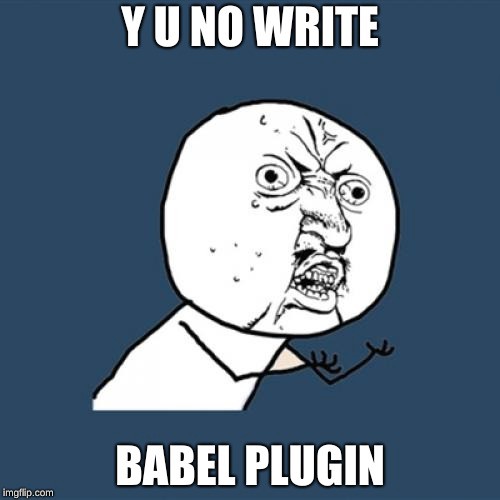Babel plugin and get a performance boost for your React components

With the introduction of React hooks (in React 16.8-alpha) arose an issue — calculations are being unnecessarily re-evaluated due to declarations being done within the rendering phase.
To put things simple, if now we’re using class components, and we store calculation results on the class instance to save ourselves some precious processing power:
class MyComponent extends React.Component {
constructor(props) {
super(props)
this.transformedData = props.data.filter(props.filterPredicate).sort(props.sortComparator)
}
render() {
return (
<div>
<button onClick={this.goBack} />
<ul>
{this.transformedData.map(({ id, value }) => (
<li key={id}>{value}</li>
))}
</ul>
</div>
)
}
goBack = () => {
this.props.history.pop()
}
}In the near future, we will have no choice but to do everything within the rendering method itself, dictated by hooks:
const MyComponent = ({ data, history, filterPredicate, sortComparator }) => {
const transformedData = data.filter(filterPredicate).sort(sortComparator)
const goBack = () => {
history.pop()
}
return (
<div>
<button onClick={goBack} />
<ul>
{transformedData.map(({ id, value }) => (
<li key={id}>{value}</li>
))}
</ul>
</div>
)
}To solve this problem, the React team invented a couple of methods: useCallback() and useMemo().
Each of them is used for different reasons but they’re quiet similar, and essentially they’re used
as guard functions that will re-activate themselves only if certain parameters were changed. I
recommend you to go through the
official React docs to get a better
perspective on these. If we were to implement it in the example above, it should look like so:
const MyComponent = ({ data, history, filterPredicate, sortComparator }) => {
const transformedData = useMemo(
() => data.filter(filterPredicate).sort(sortComparator),
[history, filterPredicate, sortComparator]
)
const goBack = useCallback(() => {
history.pop()
}, [history])
return (
<div>
<button onClick={goBack} />
<ul>
{transformedData.map(({ id, value }) => (
<li key={id}>{value}</li>
))}
</ul>
</div>
)
}Wait a minute… So does it mean that I have to wrap all my declarations in these hooks just to get performance which is on a par with class components?!

That’s right Vladimir. Even the React team suggested that, and I quote from their docs:
“In the future, a sufficiently advanced compiler could create this array automatically” — React
It’s a good thing I love React and I think of the future. That’s why I invented this Babel plug-in
called babel-plugin-react-persist, and it addresses exactly that issue! All you have to do is edit
your .babelrc file and the code will be automatically transformed! Not only that, the plug-in also
takes care of optimizing inline anonymous functions in JSX attributes. This way each rendering phase
will have a similar instance of the intended callback. So given the following code:
export default ({ data, sortComparator, filterPredicate, history }) => {
const transformedData = data.filter(filterPredicate).sort(sortComparator)
return (
<div>
<button className="back-btn" onClick={() => history.pop()} />
<ul className="data-list">
{transformedData.map(({ id, value }) => (
<li className="data-item" key={id} onClick={() => history.push(`data/${id}`)}>
{value}
</li>
))}
</ul>
</div>
)
}The plug-in will generate:
let _anonymousFnComponent, _anonymousFnComponent2
export default ({ data, sortComparator, filterPredicate, history }) => {
const transformedData = React.useMemo(
() => data.filter(filterPredicate).sort(sortComparator),
[data, data.filter, filterPredicate, sortComparator]
)
return React.createElement(
(_anonymousFnComponent2 =
_anonymousFnComponent2 ||
(() => {
const _onClick2 = React.useCallback(() => history.pop(), [history, history.pop])
return (
<div>
<button className="back-btn" onClick={_onClick2} />
<ul className="data-list">
{transformedData.map(({ id, value }) =>
React.createElement(
(_anonymousFnComponent =
_anonymousFnComponent ||
(() => {
const _onClick = React.useCallback(
() => history.push(`data/${id}`),
[history, history.push, id]
)
return (
<li className="data-item" key={id} onClick={_onClick}>
{value}
</li>
)
})),
{ key: id }
)
)}
</ul>
</div>
)
})),
null
)
}So what are you waiting for? Go visit the official GitHub repo and get yourself a copy of the plug-in! Have any suggestions or feature request? Feel free to open a ticket in the repo’s issues page or comment below!
Join our newsletter
Want to hear from us when there's something new?
Sign up and stay up to date!
*By subscribing, you agree with Beehiiv’s Terms of Service and Privacy Policy.